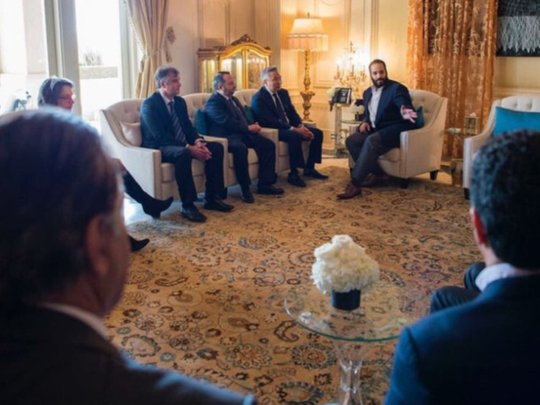
Los Angeles: Mohammad Bin Salman, the 32-year-old crown prince of Saudi Arabia, is sure to be treated like a movie star when his tour of the United States comes to Los Angeles this week.
Mohammad, who learned English by watching films as a child, is expected to dine at producer Brian Grazer’s Santa Monica home, attend an event at Rupert Murdoch’s Bel-Air estate and meet with show business power players, including talent agency boss Ari Emanuel and Walt Disney Co. Chief Executive Bob Iger.
His trip to Los Angeles -- part of a coast-to-coast American tour marked by meetings with President Trump and Silicon Valley bigwigs -- has elicited excited curiosity among entertainment industry executives who see the desert kingdom as a lucrative new market for movies -- and a potential source of much-needed financing.
Hollywood’s biggest foreign financial partner, China, has mostly stopped writing checks because of a government crackdown on foreign investments and leveraged deals that once dominated headlines.
Cinema owners and studios in the US and elsewhere have been salivating since Saudi Arabia ended its 35-year ban on movie theatres in December.
The move was part of a larger push to modernise the kingdom’s culture and diversify its oil-dependent economy.
The nation’s cinemas, once built out, could generate $1 billion in annual box-office receipts, industry experts said.
Saudi Arabia’s projected spending on entertainment projects in the next decade
“They’re all vying like crazy to get into the market,” said John Fithian, chief executive of the National Assn. of Theatre Owners, a cinema industry trade group in Washington, D.C.
“The kingdom’s decision to open up the cinema business is historic and substantial.”
It’s easy to see why Hollywood would seek to woo the prince.
Saudi Arabia has 32 million people, most of whom are under 30 years old.
Many have significant disposable income and a lack of entertainment options, a prime demographic for theatre chains.
“It is a large market, by far the largest in the Middle East,” the Saudi minister of culture and information, Awwad Al Awwad, said at his office in the Saudi capital, Riyadh.
“It is also an untapped market that hasn’t been explored before.”
Entertainment executives who meet with the prince and dignitaries are hoping to learn more about the country’s plans.
Some deals are already percolating.
The Public Investment Fund -- the kingdom’s major sovereign wealth vehicle -- is close to buying a stake of less than 10 per cent in Emanuel’s talent agency and media company Endeavor for at least $400 million.
Fund representatives declined to comment, but Saudi Arabia authorities said in February they plan to spend $64 billion on entertainment projects, including theatres and concert venues, in the next decade.
About $10 billion is set aside for film investments.
“Saudi Arabia is investing across the board to expand both the creative output of Saudi artists and entrepreneurs, and to make Saudi Arabia a central hub in what is today a truly globalised entertainment industry,” said Sandy Climan, president of Los Angeles investment and advisory firm Entertainment Media Ventures, who is a frequent visitor to the Middle East.
On Wednesday, the country’s General Entertainment Authority will host a lunchtime summit at the Four Seasons Hotel Los Angeles at Beverly Hills to discuss opportunities for the entertainment industry.
The government plans to launch its first film agency at the Cannes Film Festival in May.
Saudi Arabia, like China, wants to use its investments to learn about the global entertainment business and build a modern media industry.
A major motivation for the country’s plan is to drive tourism, and entertainment is a key part of that, experts said.
Mohammad also wants to keep young people in Saudi Arabia from fleeing to neighboring nations such as Bahrain to watch movies on the weekends.
“Prince Mohammad clearly has put an emphasis on sports and entertainment to drive tourism and bring more skilled cultural trade to the region,” said David Unger, CEO of Artist International Group, a talent manager specialising in international clients.
“Film and television are an important part of culture, and hence a cornerstone to this strategy.”
But unlike Chinese investors, the Saudis are not expected to make multibillion-dollar bids on American movie studios and production companies.
“If Hollywood is looking for another source of dumb money, we are grossly mistaken,” said Dennis Rice, head of film marketing and distribution consulting firm Visio Entertainment.
“They are very savvy and shrewd businesspeople.”









